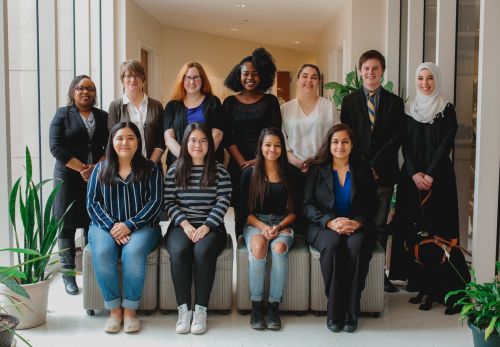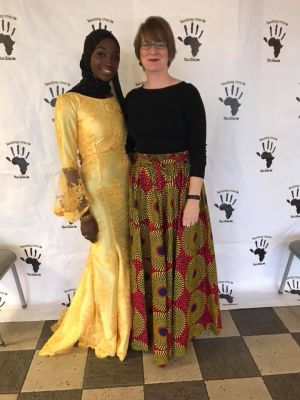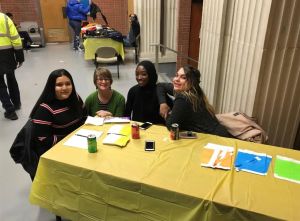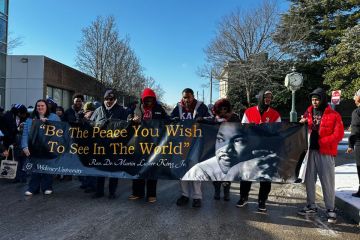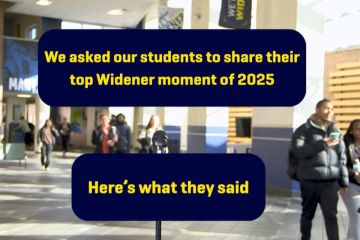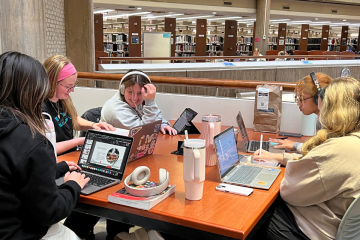The Trilingual Advantage Gives These Widener Graduates a Leg Up

Dyana Reyes grew up speaking Spanish and English at home and school, but when she came to Widener, she knew that continuing to learn a third language would give her an advantage in the psychology field.
She tapped into the French program and was connected to a vibrant network of students, alumni, faculty, and industry leaders speaking not only French but a wide range of world languages. Now, as Reyes graduates in May, she will benefit from being trilingual.
“I want to work with children on the autism spectrum and hopefully be able to communicate with them and their families in the language they are most comfortable with,” the psychology and French double major said.
The world is more globally interconnected than ever before; graduates must be global citizens and often have an advantage that can open doors to different careers in the global economy if they are proficient in multiple languages and attune to world cultures.
That’s why Widener offers undergraduate majors and minors in Spanish and French, and a minor in Italian, with language classes capped at 18 students. The university provides a strong network of faculty and peers through international clubs and the Center for Civic and Global Engagement. This network often helps students secure internships or other opportunities that allow them to practice their language skills and support their career goals.
“The study of languages gives many students a competitive edge, or what we call at Widener ‘the inside track’ as they enter the workforce,” said French Professor and Modern Language Department Chair Stephanie Schechner. “Even if an employer doesn't need them to use the language every day, these are skills that help them stand out on the job market and prepares them for a diverse workplace.”
A Welcoming, Inclusive Campus
Lena Alafouzos, an international student from Greece who is graduating in May, was attracted to Widener because of this support system and the university’s close partnership with the American Community School of Athens (ACS Athens).
Four years ago, when she first arrived to Widener, Alafouzos was connected to the Center for Civic and Global Engagement for international student orientation. The center became a trusted source for keeping up-to-date on visa requirements and meeting other students.
In the Center for Civic and Global Engagement, we advise international and study abroad students, but we also help all students develop global competencies. This includes understanding one's own culture and the cultures of diverse others. We often facilitate that learning through connections between international and domestic students. — Kandy Turner, director of International Student Services and Study Abroad Programs
Alafouzos, a business management major and marketing and human resources minor, also found a trusted group of faculty and friends on campus.
“People are very accepting and friendly,” she said. “I think it has been a great experience, and I’ve met a lot of helpful, supportive people – students as well as professors.”
Alafouzos speaks English, German, and Greek, but at Widener, she wanted to continue expanding her language skills. She took Italian classes and independently studied Spanish.
She said that being bilingual or trilingual in Europe is far more common than in the United States; therefore, knowing even more languages can be an advantage overseas, especially after she graduates in May, returns to Greece and then pursues a master’s degree in Germany.
“If I were to look for a job here in the United States, I definitely think this would be an advantage,” she said.
Languages that Lead to Internships
Fanta Koita, a French and international relations double major who speaks French, English, and Bambara (the national language of Mali), has seen firsthand how her connection to Widener’s French program has led to internships and a well-defined career path.
As a first-generation college student, Koita turned to professors like Schechner and Assistant Professor Jeremy Backstrom to help guide her through the process of picking majors, finding internships, and preparing post-graduation plans.
“Dr. Schechner has helped guide me through college, and Dr. Backstrom has helped me see how I can piece together these two majors in my job search,” Koita said.
Koita secured internships in communications and marketing roles at the Energy Co-Op and the French American Chamber of Commerce because of connections she made in Widener’s French Club. The French Club has given students like Koita and Reyes a place to practice French outside the classroom and connect with the francophone community in the region.
With graduation on the horizon, Koita has been working with Career Design & Development to convey to prospective employers how her language skills are an asset.
“Career Design & Development has been helping me understand how to implement my French language skills into my resume and how to capitalize on that in my job search,” Koita said.
She is looking for jobs in the United States, but ultimately hopes to one day run a nonprofit in West Africa.
“My life goal is to work in Mali for a nonprofit,” she said. “I know that my language skills and connections at Widener will be another tool as I work toward that goal.”

